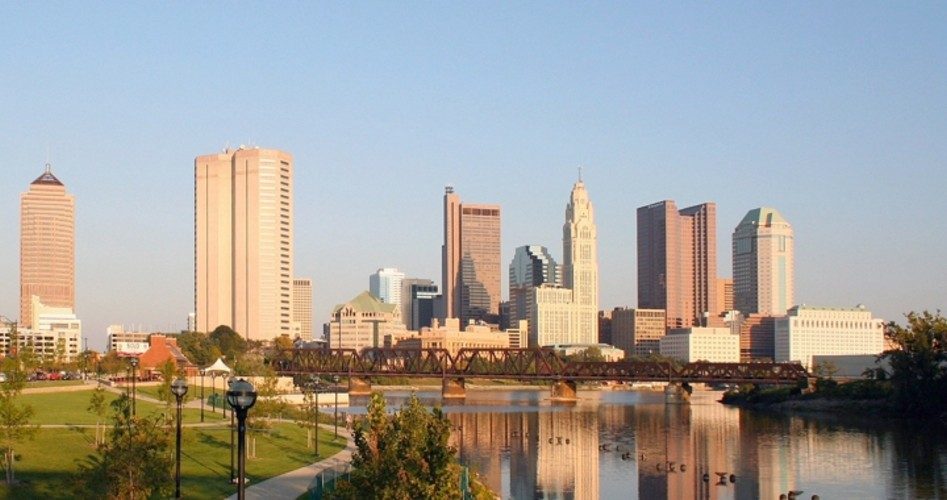
[J]
Even a city named after the famed Italian explorer Christopher Columbus — Columbus, Ohio — has decided to join the bandwagon by dropping the city’s celebration of the day that Columbus “discovered America” in 1492. Instead, the city will give its municipal employees a day off work on Monday, November 12, supposedly to honor veterans.
The city of Columbus is thought to have honored the man who sailed on behalf of Spain “for as long as it had been in existence,” said Robin Davis, speaking for Mayor Andrew Ginther, a Democrat. While city offices will now close on November 12 instead, that is not actually Veterans’ Day. Veterans’ Day falls on November 11, because that was Armistice Day, the day the fighting ended in World War One. Of course, it is all a mixture of political correctness and a way to give city workers a three-day weekend, anyway, because Columbus made it to the Western Hemisphere on October 12, 1492, not the second Monday in October.
American Indian groups and assorted activists have long attacked both the day and the man Columbus, in an effort to argue that the accidental discovery of America was the beginning of a long, hard nightmare for Native peoples. In its place, some local and state governments have opted to replace Columbus Day with Indigenous Peoples Day, contending that the Native Americans were victims of centuries of colonialism.
“We have a number of veterans who work for the city, and there are so many here in Columbus,” Davis explained. “We thought it was important to honor them with that day off.” Besides that, Davis said, the city doesn’t have the money to give employees both days off. In other words, goodbye Columbus.
Columbus is only the latest municipality to drop Columbus Day, although one would think a city named Columbus might continue honoring its namesake.
Those of Italian ancestry in Columbus were not happy with the move. For 39 years, the Columbus Italian Festival has been held on the weekend of Columbus Day, but the city failed to give the group any advance notice of the change. Board member Joseph Contino saw the city’s action as yet another example of political correctness.
“It’s very in vogue politically right now to do that. It’s not PC for me to say anything against indigenous peoples,” Contino said. “You can kick Christians, you can kick Catholics. That’s the message that it sends to us and that’s what it feels like; we’re Europeans and we lop Indians’ heads off. Which is just not true.”
Contino added that the city has missed an opportunity for economic boost, too. “If you’re mayor of a city and its name is Columbus, why wouldn’t you capitalize on that? Use it to unite everybody. Use this day to celebrate the entire culture, celebrate Italians and indigenous both.”
Tyrone Smith, director of the Native American Indian Center of Central Ohio, offered a different perspective, arguing that the city has opted to embrace its growing diversity.
Exactly how denigrating Italians is embracing diversity was not clear, but Contino touched on what this is all really about — and it is not to “celebrate diversity.”
Columbus is simply a useful straw man who is somehow held responsible for every ill that beset the Americas since the 16th Century, without giving him credit for all the good since that time. Columbus did not set out to “discover” America. Although popular culture today depicts him as mainly concerned about gold, this desire was actually part of his larger motivation to finance a crusade to free the Holy Land from Islamic domination. Expecting to reach Asia by sailing west, he urged the king and queen of Spain “to spend all the profits from this enterprise on the conquest of Jerusalem.”
The Muslims had conquered Constantinople only a few years before this, completing their multigenerational conquest of the Christian world in the East, including the Byzantine Empire and the lands where Jesus had lived, died, and risen from the dead. Columbus believed that Jerusalem would need to be in Christian hands — again — before the return of Jesus.
Certainly, Columbus did not set out to mistreat the American Indians. Indeed, he was ignorant of their very existence. His actual desire was to meet the Mongol ruler of China. The Chinese monarchs had expressed interest in the Christian faith, creating within Columbus the desire to convert China, and then, these combined forces could proceed to drive the Muslims out of the Holy Land.
Pre-Columbian America is pictured as a paradise by those who wish to denigrate Columbus, and through him, Western civilization. If Columbus is to be vilified for events that happened decades, even centuries, after his death, he should be credited with certain achievements as well. For example, Spanish Christians ended the horrific human sacrifices and cannibalism practiced by the brutal Aztec Empire.
Columbus did not commit genocide — that is a monstrous lie. The greatest cause of the premature deaths of indigenous peoples in the Western Hemisphere was disease. That is hardly the fault of Columbus. To believe he intended to wipe out tribal peoples with disease must mean that he was plotting to do that in China!
Finally, Columbus brought Christianity to the New World. If one had to make a “short list” of persons in history who did the most to improve the lives of more human beings, Columbus should make that list.
The effort to demonize Columbus is part of the larger campaign to attack the foundations of Western civilization. Once such men as Columbus, Washington, and Jefferson can be removed as objects of admiration, they can be replaced with leftist icons, for the purpose of advancing a secular and socialist agenda.
For whatever reason, the political leaders of Columbus, Ohio are either ignorant of why their city was named after Columbus, or they are complicit in this effort to overturn Western Civilization. Or maybe they just don’t have the backbone to resist.
Steve Byas is the author of History’s Greatest Libels, a challenge to the liberal attacks on great men and women of history. He devotes one chapter in his book to Christopher Columbus.


